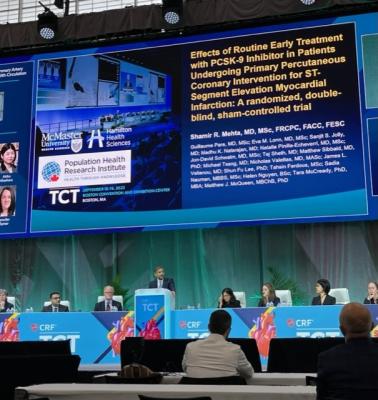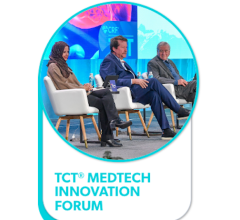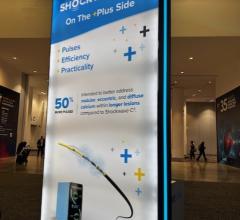
Significant findings from the highly-anticipated EPIC-STEMI study were presented by Shamir R. Mehta, MD, MSc, FACC, at the recent Transcatheter Cardiovascular Therapeutics (TCT) 2022 Annual Symposium in Boston, MA, coordinated by the Cardiovascular Research Foundation (CRF).
October 17, 2022 — Significant findings from the highly-anticipated EPIC-STEMI study were presented during a late-breaking scientific session at the recent Transcatheter Cardiovascular Therapeutics (TCT) 2022 Annual Symposium in Boston, MA.
Shamir R. Mehta, MD, MSc, FACC, is a professor of the Department of Medicine, Director of interventional cardiology at Hamilton Health Sciences, and Senior Scientist and Director of the Acute Coronary Syndrome Research program at the Population Health Research Institute (PHRI) of McMaster University and Hamilton Health Sciences in Hamilton, Ontario, Canada. A Cardiovascular Research Foundation (CRF) Faculty member, Mehta presented results of the EPIC STEMI Study (NCT03718286) during the Sept. 19 Clinical Science in Coronary Artery Disease: Session VI, in Collaboration with the journal Circulation.
Mehta was principal investigator on the study, “Randomized, Double-Blind Trial of Routine Early Treatment With PCSK-9 inhibitor in Patients Undergoing Primary Percutaneous Coronary Intervention for ST-Segment Elevation Myocardial Infarction.” The presentation at CRF’s TCT2022 coincided with the simultaneously published in EuroIntervention.
Co-authors included: Guillaume Pare, MD, MSc; Eva M Lonn, MD, MSc; Sanjit S Jolly, MD; Madhu K Natarajan, MD; Natalia Pinilla-Echeverri, MD, MSc; Jon-David Schwalm, MD, MSc; Tej N. Sheth, MD; Matthew Sibbald, MD, PhD; Michael Tsang, MD; Nicholas Valettas, MD, MASc; James L Velianou, MD; Shun Fu Lee, PhD; Tahsin Ferdous, MSc; Sadia Nauman, MBBS, MSc; Helen Nguyen, BSc; Tara McCready, PhD, MBA; Matthew J McQueen, MBChB, PhD.
Overview
The study was a randomized, double-blind, placebo controlled parallel group clinical trial evaluating the effects of acute treatment with a PCSK9 inhibitor (alirocumab) versus placebo on low-density lipoprotein (LDL) in 100 high-risk patients presenting with STEMI and referred for primary PCI.
The objective was to determine the effect of acute, rapid lowering of LDL cholesterol with alirocumab added to high dose statin therapy in patients with STEMI undergoing primary PCI. The hypothesis is that, in patients with STEMI undergoing primary PCI, rapid lowering of LDL cholesterol with a PCSK9 Inhibitor (alirocumab) initiated in the acute setting pre-PCI, will favorably affect LDL cholesterol concentrations compared with placebo.
Insights and Implications
In an interview with “TCT Live” just after the presentation, conducted by Michael Gibson, MD, Mehta discussed the study, its findings and the implications for supporting patients with STEMI.
"This is a trial that has needed be done for a very long time,” offered Mehta. He described the methods and goal, by adding, “We took patients with full blown STEMI presenting in the cath lab and we randomized them to receive PCSK9 or SHAM control on top of high dose statin therapy. The goal was to determine how much cholesterol reduction we can get in addition to high dose statin in mostly statin naïve patients.”
What did they learn? According to Mehta, “We found there was a 22% relative risk reduction in LDL at the primary follow up in 6 weeks. That reduction is in statin naïve patients as well as in patients on prior statin therapy. We did not have an LDL cut off, we just gave the drug routinely. The premise was that they came in with a life changing STEMI event.”
Further, Mehta noted, “We withdrew the PCSK9 inhibitor, and all of the benefit was lost. The point is to make a statement. These are the best drugs we have available for lowering cardiovascular risk. As Interventional Cardiologists, yes, we do the primary PCI and we do the intervention but really this patient has to live their entire life. These drugs by and large are being used in 1% of patients, they are being withheld from the highest risk patients who could potentially benefit from this therapy, and these trials are not being done. Moving forward, the question is, moving forward, how we get these trials done? How do we get them funded and completed?”
Study Details
Background:
- In patients with STEMI, early initiation of high intensity statin therapy, regardless of baseline LDL level, is a standard practice worldwide.
- PCSK9 inhibitors further reduce LDL and events, but have not been studied when given acutely, nor as routine treatment
- Whether a simplified regimen of initiating PCSK9 inhibitor routinely in the acute setting of STEMI on top of high intensity statins would add additional benefit by further reducing LDL cholesterol levels in a much wide population of patients is unknown.
- On a population level, such an approach would expect to substantially reduce the number of major cardiovascular events in this high-risk population.
Objectives:
EPIC-STEMI was designed to evaluate the routine, early administration of PCSK9 inhibitor, regardless of baseline LDL levels or prior statin use, in order to determine:
1. The degree of LDL reduction that might be expected with this approach
2. The time course of LDL lowering during the acute period after STEMI
3. The overall feasibility of this approach
Conclusions:
In patients with STEMI undergoing primary PCI, the routine early initiation of PCSK9 inhibitor (regardless of baseline LDL level or prior statin use) compared with sham-control:
1. Reduced LDL cholesterol by 22%^ at 6 weeks (median 45 days) on a background of high intensity statin therapy.
2. Resulted in a greater proportion of patients achieving >50% reduction or ESC LDL target of <_ 1.4 mmo/L (70 mg/dL).
3. Appeared to be feasible and safe.
Implications:
· Routine, early administration of PCSK9 inhibitor has the potential to substantially reduce morbidity and mortality globally after high-risk ACS by further reducing LDL beyond statins in a much greater number of high-risk patients that is currently treated with these agents.
· A large outcomes trial evaluating this simplified strategy is needed.
About the Presenter
Shamir R. Mehta, MD, MSc, FACC leads the ACS and Interventional Cardiology research group at the Population Health Research Institute (PHRI) of McMaster University and Hamilton Health Sciences in Hamilton, Ontario, Canada. He is known for landmark trials such as COMPLETE (2019, NEJM), renowned globally for leading revascularization strategies for acute coronary syndromes, noted PHRI in a biographical feature. Previously, Mehta has led studies showing that combination treatment with different types of antiplatelet agents and anti-coagulants were effective and safe in reducing death and complications in those with a heart attack. Mehta was appointed as the first Douglas Holder/PHRI Chair in Interventional Cardiology, effective May, 2021.
Mehta’s research has transformed the treatment of heart attacks with the concept of ‘complete revascularization’, the unblocking of multiple coronary blood vessels, which will save lives worldwide. This treatment led him to trial a fractional flow reserve test to measure whether a blockage is serious enough to need removing. Blood flow around a blockage is measured by a wire probe attached to the affected coronary artery. Dr. Mehta has published his research in nine books and more than 200 journal articles. Mehta received the 2003 Canadian Institutes of Health Research New Investigator Career Award, and he is on the leadership council of PHRI. He was also named one of Canada’s "Top 40 Under 40" achievers in 2004 for his contributions to medicine. He is a member of the Equity, Diversity and Inclusion Committee of the Department of Medicine and previously served as chair of the Pharmacy and Therapeutics Committee at Hamilton Health Sciences.
Reference:
https://clinicaltrials.gov/ct2/show/NCT03718286
For additional TCT2022 coverage, go to: https://tct2022.crfconnect.com/


 October 31, 2025
October 31, 2025 









